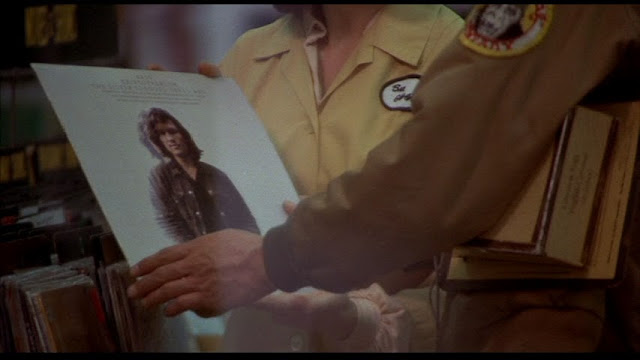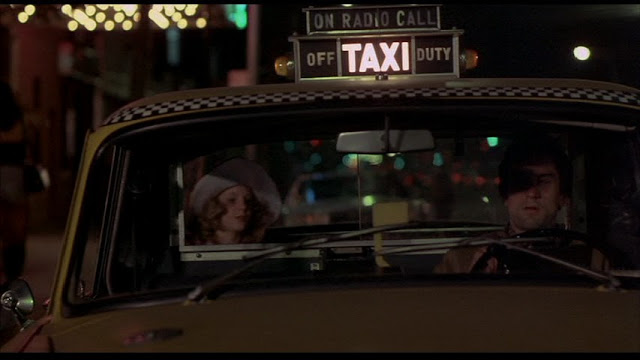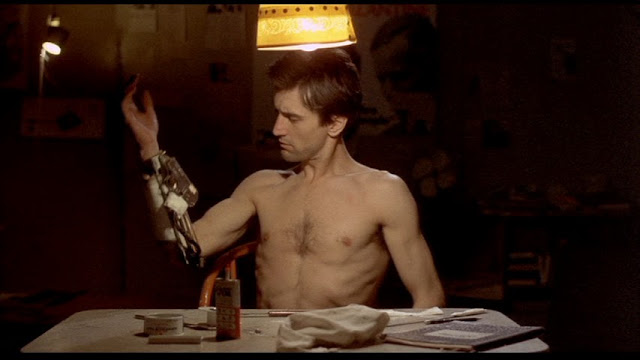[Image at left from the Wikipedia 'Taxi Driver' page; "Taxi Driver original movie poster",[a] licensed under fair use via Wikipedia.]
Welcome to the analysis of Taxi Driver. Buttons at the bottom of each post enable navigation through the parts of the analysis. Regarding the appearance of possible anti-Semitism on this blog, please see the 'Disclaimers' section near the bottom of this page.
Taxi Driver is a 1976 American thriller film directed by Martin Scorsese and written by Paul Schrader. The film is set in New York City, following the Vietnam War.
Travis Bickle (Robert De Niro) is a lonely and depressed young man, an honorably discharged U.S. Marine, living in New York City. He becomes a taxi driver in order to cope with chronic insomnia, driving passengers every night around the boroughs of New York. He also spends time in seedy 'porn' theaters and keeps a diary.

Above left: Travis (standing) applies for a job as a taxi driver. Above right: Travis writes in his diary.

Eventually Travis develops a romantic attachment to Betsy (Cybill Shepherd), a campaign volunteer for Senator Charles Palantine (Leonard Harris), who is running for a Presidential nomination. After watching her through her office window, Travis enters to volunteer as a pretext to talk to her (above left), and after her workday is over, he takes her out for coffee and some food (above right). During this get-together, Betsy tells Travis that he reminds her of a Kris Kristofferson song; she recites a portion of the lyrics from this song (as she remembers them): "He's a prophet and a pusher, partly truth, partly fiction, a walking contradiction." When Travis says, "I'm no pusher - I never have pushed", Betsy explains that it is "just the part about the contradictions" that reminds her of Travis.

Above left and right: Travis isn't a drug dealer, but he is a substance abuser.
Not long after the meal with Betsy, Travis goes to a record store and buys the Kristofferson album (The Silver Tongued Devil and I, released in 1971), which includes the song Betsy quoted from, The Pilgrim - Chapter 33. The portion of the song Betsy recited is, in full, "He's a prophet, he's a pusher-- / He's a pilgrim and a preacher, and a problem when he's stoned-- / He's a walkin' contradiction, partly truth and partly fiction." (listen on YouTube here).
Later, teenage prostitute Iris (Jodie Foster) enters Travis's cab, attempting to escape her pimp, "Sport" (Harvey Keitel). Sport drags Iris from the cab and throws Travis a crumpled twenty-dollar bill, which continually reminds him of her.


Top left: Iris in Travis's taxi. Top right: Iris's pimp, Sport, pulls Iris from the cab. Above left: Sport throws Travis a twenty-dollar bill. Above right: The crumpled bill continually reminds Travis of Iris.
Travis takes Betsy to see a sex film, which offends her, so she goes home alone. His attempts at reconciliation by sending flowers are rebuffed so he berates her at the campaign office, before being kicked out by Tom (Albert Brooks).
Travis confides in fellow taxi driver Wizard (the balding man in the screencap at left) about his worrisome thoughts. Wizard advises Travis to go out and get laid or get drunk, then a little later in the conversation, he tells Travis to relax and things will be fine.
Disgusted by the street crime and prostitution that he witnesses throughout the city, Travis finds a focus for his frustration and begins a program of intense physical training (below left). He buys guns from dealer Easy Andy (below right).

Travis constructs a sleeve gun to attach to his arm (shown at left); he then practices drawing his weapons.
One night, Travis enters a convenience store moments before an attempted armed robbery and he shoots and kills the robber. The shop owner takes responsibility for the shooting, taking Travis's handgun.
Some time later, Travis hires Iris, but instead of having sex with her, he tries to dissuade her from continuing in prostitution (below left). They meet for breakfast the next day (below right), and during the meal, he attempts to persuade her to return home to her parents.

Later, after shaving his head into a mohawk, Travis attends a public rally at which he intends to assassinate Senator Palantine, but Secret Service agents notice him and he flees.

Above left: Travis at Senator Palantine's rally. Above right: Senator Palantine (center, with arms outstretched) speaking at the rally.
Travis returns to his apartment and then drives to the East Village, where he confronts Sport. Travis shoots and injures him, then walks into Iris's brothel and shoots the brothel's bouncer, injuring him. After Sport shoots Travis in the neck, seriously wounding him, Travis shoots Sport dead. A thug appears and shoots Travis in the arm, but Travis reveals his sleeve gun and kills the thug. The bouncer continues to harass Travis, so Travis stabs him, then shoots him in the head, killing him. As a horrified Iris cries, Travis attempts suicide but, out of ammunition, resigns himself to a sofa until police arrive. When they do, he places his index finger against his temple gesturing the act of shooting himself.

Above left: Travis shoots the bouncer in Iris's building. Above right: Travis feigns shooting himself with his left index finger.
Later, after recuperating from being in a coma, Travis receives a letter (below left) from Iris's parents who thank him for saving her and the media hail him as a hero. Travis then returns to his job and encounters Betsy as a fare. While riding in his cab, she mentions that she read about him in the paper. Travis drops her off for free (below right). He glances anxiously at something (or someone) in his rear view mirror as he drives away.[b]

a. Poster for Taxi Driver: The poster art copyright is believed to belong to the distributor of the film, the publisher of the film or the graphic artist.
b. Wikipedia, 'Taxi Driver'. Web, n.d. URL = https://en.wikipedia.org/wiki/Taxi_Driver.
All song lyrics in this post are believed to be used in accordance with the U.S. Copyright Fair Use Act (Title 17 U.S. Code).













